Wikipedia:Picture of the day/December 2006
|
Featured picture tools: |
These featured pictures, as scheduled below, appeared as the picture of the day (POTD) on the English Wikipedia's Main Page in December 2006.
You can add an automatically updating POTD template to your user page using {{Pic of the day}} (version with blurb) or {{POTD}} (version without blurb). For instructions on how to make custom POTD layouts, see Wikipedia:Picture of the day.
December 1 - Fri
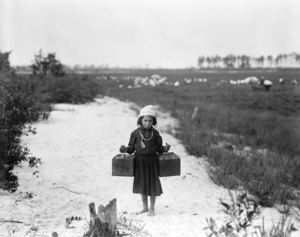
|
Ten-year-old Rose Biodo, carrying two pecks of berries, an example of child labor. This was her third summer working in Browns Mills, New Jersey, approximately 36 miles (58 km) from her hometown of Philadelphia, Pennsylvania. The photo was taken on September 28, 1910, four weeks into the school year, and she was expected to stay on the job for another two weeks. Photo credit: Lewis Hine |
Text version ( view - - talk - history ) — Condensed version ( view - )
Column version ( view - ) — Row version ( view - )
December 2 - Sat

|
Two Northern Gannets (Morus bassanus), displaying affection, an example of pair bonding. Gannet pairs may remain together over several seasons. They perform elaborate greeting rituals at the nest, stretching their bills and necks skywards and gently tapping bills together. Photo credit: Alan D. Wilson/Outriggr |
Text version ( view - - talk - history ) — Condensed version ( view - )
Column version ( view - ) — Row version ( view - )
December 3 - Sun

|
An animation showing how a zipper works. The slider, which is operated by hand, moves along the rows of teeth. Inside the slider is a Y-shaped channel that meshes together, or separates, the opposing rows of teeth, depending on its direction of travel. The zipper, originally called a "hookless fastener", was invented in 1913 by Gideon Sundback. "Zipper" was originally a trademark of the B.F. Goodrich Company for the line of rubber overshoes that it made using the fastener, but the term became associated with the fastener and acquired generic status. Animation credit: Dominique Toussaint |
Text version ( view - - talk - history ) — Condensed version ( view - )
Column version ( view - ) — Row version ( view - ) — Animated version ( view - )
December 4 - Mon

|
The Pioneer plaque, which was included on both Pioneer 10 and Pioneer 11 unmanned spacecraft, the first man-made objects to leave the Solar System. Made from gold-anodised aluminium, the plaque shows the figures of a man and a woman along with several symbols that are designed to provide information about the origin of the spacecraft. However, the mean time for the spacecraft to come within 30 astronomical units of a star is longer than the current age of our galaxy. Plaque credit: Carl Sagan, Frank Drake, Linda Salzman Sagan |
Text version ( view - - talk - history ) — Condensed version ( view - )
Column version ( view - ) — Row version ( view - )
December 5 - Tue
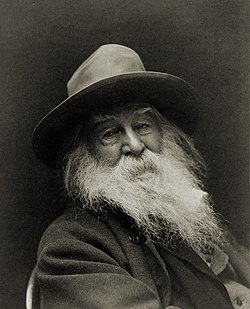
|
A head-and-shoulders portrait from 1887 of Walt Whitman, widely considered to be one of America's best and most influential poets. He abandoned the rhythmic and metrical structures of European poetry for an expansionist freestyle verse, which delivered his philosophical view that America was destined to reinvent the world as emancipator and liberator of the human spirit. His most famous work is Leaves of Grass, which he self-published in 1864 and continued to edit and revise until his death. This image is said to have been Whitman's favorite from the photo session. Photo credit: George C. Cox/Korath |
Text version ( view - - talk - history ) — Condensed version ( view - )
Column version ( view - ) — Row version ( view - )
December 6 - Wed

|
Antony Gormley's most famous work, Angel of the North, is a steel sculpture of an angel in Gateshead, England, standing 20 metres (66 feet) tall, with wings 54 metres (178 feet) — making it wider than the Statue of Liberty is tall. The wings themselves are not flat, but are angled 3.5 degrees forward, which Gormley has been quoted as saying was to create "a sense of embrace". Photo credit: David Wilson Clarke |
Text version ( view - - talk - history ) — Condensed version ( view - )
Column version ( view - ) — Row version ( view - )
December 7 - Thu

|
A Nishi tribesman wearing the traditional head-dress having a hornbill beak. The Nishi are found in the Indian state of Arunachal Pradesh. The custom of wearing a hornbill beak has had a deleterious effect on the bird's population. Nature reserves are being set up to protect the birds, while artificial materials, such as fibreglass, have been introduced as an alternative. Photo credit: Doniv79/Janke |
Text version ( view - - talk - history ) — Condensed version ( view - )
Column version ( view - ) — Row version ( view - )
December 8 - Fri
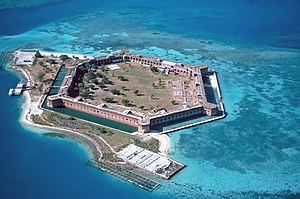
|
An aerial view of Fort Jefferson in Dry Tortugas National Park, located at the end of the Florida Keys, United States. As seen easily in the photo, the clear waters in shallow areas surrounding Fort Jefferson are popular for snorkeling and scuba diving. Visible on the right side of the image is a breach of the seawall caused by the direct strike of Hurricane Charley in August 2004. Photo credit: National Park Service |
Text version ( view - - talk - history ) — Condensed version ( view - )
Column version ( view - ) — Row version ( view - )
December 9 - Sat

|
A vertical Tibetan prayer flag in the Zanskar region of northern India. The vertical style, called darchor, is less common than the horizontal style, called lungta. Horizontal prayer flags are squares connected at the top edges with a long thread. The vertical prayer flags are usually single squares or groups of squares sewn on poles which are planted in the ground or on rooftops. Unique to Tibetan Buddhism, these flags are panels or rectangles of colourful cloth strung along mountain ridges and peaks in the Himalayas to bless the surrounding countryside. Prayer flags are believed to have originated with the original Bön religion which pre-dated Buddhism in Tibet. Photo credit: Moumine |
Text version ( view - - talk - history ) — Condensed version ( view - )
Column version ( view - ) — Row version ( view - )
December 10 - Sun

|
The United States Capitol at night. The Capitol is the meeting-place of the Congress, the legislative branch of the U.S. federal government. It is located in Washington, D.C., on top of Capitol Hill at the east end of the National Mall. The building is marked by its central dome above a rotunda and two wings. It is an exemplar of the Neoclassical architectural style. Photo credit: Diliff |
Text version ( view - - talk - history ) — Condensed version ( view - )
Column version ( view - ) — Row version ( view - )
December 11 - Mon

|
A male Mallard in mid-flight. The fundamentals of bird flight are similar to those of aircraft. Lift force is produced by the action of air-flow on the wing, which is an airfoil. This occurs because the air has a lower air pressure just above the wing and higher pressure below. When a bird flaps its wings they continue to develop lift but they also create an additional forward and upward force, thrust, to counteract its weight and drag. Photo credit: Alan D. Wilson |
Text version ( view - - talk - history ) — Condensed version ( view - )
Column version ( view - ) — Row version ( view - )
December 12 - Tue

|
The Aisawan Thiphya-Art (Divine Seat of Personal Freedom), a pavilion found at Bang Pa In Royal Palace in Bang Pa In, Ayutthaya Province, Thailand. The palace complex was formerly used by the Thai kings as a summer dwelling. Most of the present buildings were constructed between 1872 and 1889 by King Chulalongkorn. Photo credit: Dan Smith |
Text version ( view - - talk - history ) — Condensed version ( view - )
Column version ( view - ) — Row version ( view - )
December 13 - Wed

|
A camouflaged flounder. Camouflage is the method which allows an otherwise visible organism or object to remain indiscernible from the surrounding environment. Besides blending in with their surroundings, animals may disguise themselves as something else to avoid predation. Photo credit: Moondigger |
Text version ( view - - talk - history ) — Condensed version ( view - )
Column version ( view - ) — Row version ( view - )
December 14 - Thu

|
A large bolt of lightning strikes west of downtown Denver, Colorado, with the Qwest Tower (center) in plain view. Denver, known as the "Mile-High City" because its official elevation is one mile (1.6 km), is the capital and largest city of the U.S. state of Colorado. In the spring and summer, Denver is subject to monsoon conditions with frequent thunderstorms. Photo credit: Dag Peak |
Text version ( view - - talk - history ) — Condensed version ( view - )
Column version ( view - ) — Row version ( view - )
December 15 - Fri
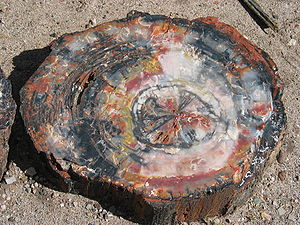
|
Petrified wood, such as this sample found in Petrified Forest National Park, Arizona, United States, is a fossil wood where all the organic materials have been replaced with minerals, while retaining the original structure of the wood. The petrifaction process occurs underground, when wood becomes buried under sediment. Mineral-rich water flowing through the sediment deposits minerals in the plant's cells and as the lignin and cellulose decay, a stone cast forms in its place. Photo credit: Daniel Schwen |
Text version ( view - - talk - history ) — Condensed version ( view - )
Column version ( view - ) — Row version ( view - )
December 16 - Sat

|
A close-up of the face of a Culpeo, clearly showing its vibrissae, or whiskers. Vibrissae are specialized hairs that grow around the nostrils or other parts of the face in most mammals. They offer an advantage to animals that do not always have sight to rely on to navigate, or to find food, or when the usefulness of non-tactile senses is limited. Photo credit: Whaldener Endo |
Text version ( view - - talk - history ) — Condensed version ( view - )
Column version ( view - ) — Row version ( view - )
December 17 - Sun

|
The assembled human DNA clamp, a trimer of the protein PCNA, is a processivity factor that increases the speed and efficiency of DNA replication. In the assembled replication complex, the clamp encircles the DNA, which passes through the central pore, and binds DNA polymerase to prevent the enzyme from dissociating from the template DNA strand. The DNA clamp protein's presence can increase the rate of DNA synthesis up to 1,000-fold versus a nonprocessive polymerase. Illustration credit: Opabinia regalis |
Text version ( view - - talk - history ) — Condensed version ( view - )
Column version ( view - ) — Row version ( view - )
December 18 - Mon

|
Cutaway diagram of the interior of a plant cell. Plant cell are quite different from the cells of the other eukaryotic kingdom's organisms. Like other eukaryotic cells, plant cells typically also have a nucleus, containing most of the cell's DNA, and mitochondria, the 'power plants' of the cell. However, some parts of a living plant's tissue are selectively dead so they can serve the plant without consuming vital nutrients. Illustration credit: Mariana Ruiz |
Text version ( view - - talk - history ) — Condensed version ( view - )
Column version ( view - ) — Row version ( view - )
December 19 - Tue

|
A Supermarine Spitfire Mark XVI. The Spitfire was an iconic British single-seat fighter used by the RAF and many Allied countries in the Second World War. The Spitfire saw service during the whole of WWII in all theatres of war, and in many different variants. It is often credited with winning the Battle of Britain. Photo credit: Chowells |
Text version ( view - - talk - history ) — Condensed version ( view - )
Column version ( view - ) — Row version ( view - )
December 20 - Wed

|
Cerro de la Silla, or Saddle Hill, is an imposing landmark and Natural Monument of the city of Monterrey in Mexico. The tallest of its four peaks, the Pico Norte, is 1820 m (5970 ft) high. The mountain is a popular recreational area, although since the city is at an altitude of 560 m (1837 ft) the climb to the top is relatively challenging. This picture, taken from the west, shows the profile of the "saddle" to its best advantage. Photo credit: Nathaniel C. Sheetz |
Text version ( view - - talk - history ) — Condensed version ( view - )
Column version ( view - ) — Row version ( view - )
December 21 - Thu
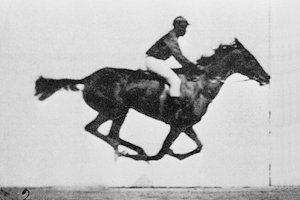
|
An animated image of Eadweard Muybridge's pioneering high speed photography, demonstrating that a horse's feet all leave the ground during a gallop. Muybridge used a battery of cameras lined along a track. The first camera had to be triggered manually, but the rest were automatically triggered by an electronic apparatus he designed. Animation credit: Waugsberg, from photos by Eadweard Muybridge |
Text version ( view - - talk - history ) — Condensed version ( view - )
Column version ( view - ) — Row version ( view - )
— Animated version ( view - )
December 22 - Fri
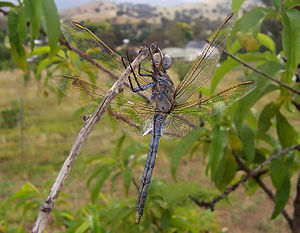
|
The Blue Skimmer (Orthetrum caledonicum) is a common Australian dragonfly. The species is widespread throughout mainland Australia and extending to Tasmania. It is also found in New Guinea, New Caledonia, Loyalty Islands and Lesser Sunda Islands. It inhabits a range of still and flowing water habitats including temporary waters. Photo credit: Fir0002 |
Text version ( view - - talk - history ) — Condensed version ( view - )
Column version ( view - ) — Row version ( view - )
December 23 - Sat

|
The European Squid (Loligo vulgaris) is a large squid belonging to the family Loliginidae. It occurs abundantly in coastal waters of the North Sea to at least the west coast of Africa. This species lives from sea level to depths of 500 m. Photo credit: Hans Hillewaert |
Text version ( view - - talk - history ) — Condensed version ( view - )
Column version ( view - ) — Row version ( view - )
December 24 - Sun

|
The Washington Monument at dusk. The monument is a large white-colored obelisk at the west end of the National Mall in Washington, D.C.. It is a United States Presidential Memorial constructed for George Washington, the first President of the United States, and is made of marble, granite, and sandstone. Construction began in 1848 but did not complete until 1884, due to lack of funds and the intervention of the American Civil War. Upon completion, it became the world's tallest structure at 558 ft (169 m), a title it inherited from the Cologne Cathedral and held until 1889, when the Eiffel Tower was finished. Photo credit: Diliff |
Text version ( view - - talk - history ) — Condensed version ( view - )
Column version ( view - ) — Row version ( view - )
December 25 - Mon

|
A mosaic image of the Crab Nebula, a six-light-year-wide expanding remnant of a star's supernova explosion. Chinese and Arab astronomers recorded this violent event nearly 1,000 years ago in 1054. The nebula derives its name from its appearance in a drawing made by Irish astronomer Lord Rosse in 1844, using a 36-inch telescope. The nebula contains a pulsar in its centre which rotates thirty times per second, emitting pulses of radiation from gamma rays to radio waves. The nebula was the first astronomical object identified with a historical supernova explosion. Photo credit: Hubble Space Telescope |
Text version ( view - - talk - history ) — Condensed version ( view - )
Column version ( view - ) — Row version ( view - )
December 26 - Tue

|
A series of torii, the defining feature of Fushimi Inari-taisha, a Shinto shrine dedicated to the spirit Inari in Kyoto, Japan. The thousands of vermilion torii gates are all donations from individuals, families or companies. The shrine was recently featured in the 2005 film Memoirs of a Geisha. Photo credit: Paul Vlaar |
Text version ( view - - talk - history ) — Condensed version ( view - )
Column version ( view - ) — Row version ( view - )
December 27 - Wed
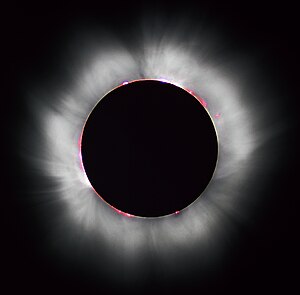
|
The solar eclipse of 1999 August 11, as seen from France. This was the most viewed total eclipse in human history, although some areas offered impaired visibility due to adverse weather conditions. The path of the Moon's shadow began in the Atlantic Ocean, before traversing Cornwall, northern France, southern Germany, Austria, Hungary and northern Serbia. Its maximum was in Romania, and it continued across the Black Sea, Turkey, Iran, southern Pakistan and India. Photo credit: Luc Viatour |
Text version ( view - - talk - history ) — Condensed version ( view - )
Column version ( view - ) — Row version ( view - )
December 28 - Thu

|
An F/A-18 Hornet during takeoff from the USS Kitty Hawk. Takeoff is the phase of flight where an aircraft goes through a transition from moving along the ground (taxiing) to flying in the air, usually on a runway. For a balloon, helicopter and some specialized fixed-wing aircraft (VTOL aircraft such as the Harrier), no runway is needed. Takeoff is the opposite of landing. Photo credit: Photographer's Mate 3rd Class Jonathan Chandler, U.S. Navy |
Text version ( view - - talk - history ) — Condensed version ( view - )
Column version ( view - ) — Row version ( view - )
December 29 - Fri

|
A branch from a pine tree, with both male and female pine cones. The male cones produce pollen and are orange, growing in a cluster. The female seed-producing cone, located at the end of the branch, is still immature. Photo credit: Menchi |
Text version ( view - - talk - history ) — Condensed version ( view - )
Column version ( view - ) — Row version ( view - )
December 30 - Sat

|
A B-1 Lancer dropping back after aerial refueling training over the Pacific Ocean. The B-1 is a long-range strategic bomber in service with the United States Air Force. Together with the B-52 Stratofortress and the B-2 Spirit, it is the backbone of the United States' long-range bomber force. Photo credit: Staff Sgt. Bennie J. Davis III, USAF |
Text version ( view - - talk - history ) — Condensed version ( view - )
Column version ( view - ) — Row version ( view - )
December 31 - Sun

|
An anole lizard of the family Polychrotidae found in Hilo, Hawaii, United States. Anoles are small and common lizards that can be found throughout the various regions of the Western Hemisphere. They are frequently and incorrectly called chameleons or geckos due to their ability to alter their skin color and run up walls, respectively. Photo credit: Paul Hirst |
Text version ( view - - talk - history ) — Condensed version ( view - )
Column version ( view - ) — Row version ( view - )
Picture of the day archives and future dates
